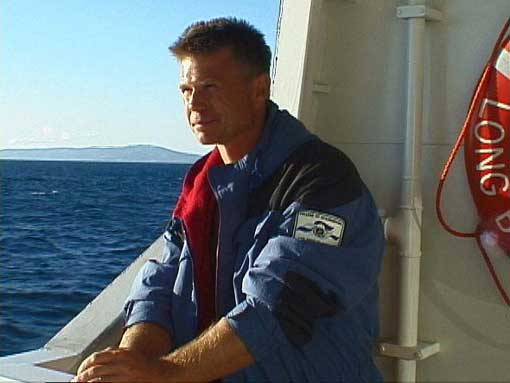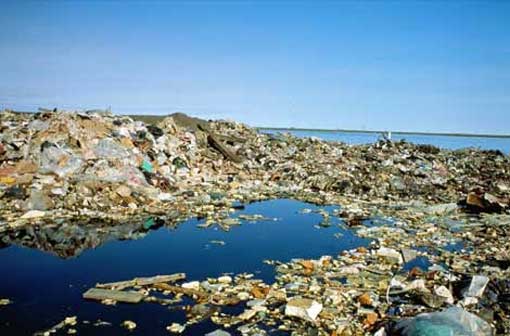You are hereBlogs / WcP.Story.Teller's blog / World-record holder to attempt 30-mile non-stop scuba dive off California coast to highlight ocean crisis and save marine life
World-record holder to attempt 30-mile non-stop scuba dive off California coast to highlight ocean crisis and save marine life

Victoria filmaker Ian Hinkle will shoot undersea footage of Scott Cassell's potentially world-record non-stop dive Saturday, from Catalina Island's avalon Harbor to Los Angeles.

(quote)
Going to great depths to save ocean life
Scott Cassell already holds the record for longest non-stop dive but is ready to break it again while trying to preserve ocean life.
On September 17, the explorer and combat/commercial diver will attempt a 30-mile (48-kilometre) non-stop SCUBA dive from Catalina Island to Los Angeles, gathering information about shark population and what the ocean actually holds, a task that only human effort can accurately collect.
“[The ocean] is where monsters dwell,” says Cassell, who has spent more than 13,000 hours under water in his lifetime, “Where man’s imagination can become reality because it truly does have the most magnificent animals to ever have existed.”
From 1,000 ft. to 3,000 ft., he will be diving through two great white shark strike zones, and an area that has been known to contain very large Mako sharks, to calculate how many sharks there are in Southern California.
Aside from sharks, other dangers Cassell is prepared to face include hypothermia, decompression sickness, extraordinary currents, equipment failure, and physical exhaustion.
For this diver, however, his safety, although important, is not top priority. “Every dive is a mission,” says Cassell. “And the mission is always first.”
Cassell considers himself a man who takes responsibility for everything in his world. In this case, that's the ocean and the animals that dwell underneath.
“If we, as humans, were to see the devastation, in chronological form, that has occurred in the ocean, as if it were on land we would be horrified,” he says.
To call this a successful dive, he says he needs to make it from point A to point B non-stop, collect observations, and report his findings.
At the end, he plans to produce a documentary and lecture series to expose this information to the public.
A Vancouver crew of producers and filmmakers has joined him in the mission, helping raise money for Cassell’s conservation work and documenting the record-breaking attempt.
Victoria filmmaker to follow diver's 50-km undersea trek - Marathon scuba dive intended to draw attention to ocean's environmental crisis
When Victoria filmmaker Ian Hinkle finishes shooting undersea footage of a scuba-diving marathon in southern California's Pacific waters that once teemed with blue sharks, it's safe to say his film won't be mistaken for Shark Night 3D.
Sure, there will be sharks and other ocean predators - and 3D cameras. They're part of an arsenal of equipment to be operated by Hinkle, media director for the Canadian social enterprise Global Reef, and his team of land and underwater photographers from near and far - uniting this weekend for a fascinating expedition and his documentary chronicling it.
But 30-Mile-Dive isn't Hollywood escapism. The film's "star" - Scott Cassell, veteran deep-sea explorer and U.S. counter-terrorism operative - will attempt a non-stop scuba dive at more than six metres deep for 50 kilometres, from Catalina Island's Avalon Harbor to Los Angeles, using state-of-the-art equipment to perform scientific experiments and convey a sobering message.
(You can track the dive's progress undersea starting Saturday at www.globalreef.org)
The goal is to draw attention to an ocean crisis that, being underwater, is conveniently out of sight, yet frighteningly real.
"That's why I joined the expedition as a filmmaker," explained Hinkle, who hails from Washington state, has a BA in film from UBC and has two decades of production experience in capacities from cinematographer to producer. Specializing in socio-political and environmental issues, he has long been attracted to adventure stories. Since making his directorial debut on The Living Coast for Discovery Channel, he has worked on several documentaries with climbers and solosailors.
But 30-Mile-Dive is about more than just a good athlete and a potentially world-record dive, Hinkle, 40, says. "He's not staying underwater for 15 hours for selfish reasons. He's an endurance athlete doing something for a greater good."
Cassell, who has logged more than 13,000 hours as an underwater explorer, combat and commercial diver, is also a U.S. Navy diving supervisor and medical technician, and holds the world record for longest non-stop dive distance - 84 km.
He says he fell in love with the ocean as a boy, and found his value in life from then on. "If we were to see the devastation that has occurred in the ocean - as if it were on land - we would be horrified," said Cassell, who is distressed by such horrors as endangered tuna populations and as millions of sharks routinely killed for fins each year. "When I see people harming it, I take that personally."
Cassell, who has been researching human endurance in salt water cooler than 20 C, said his original intention was to dive for 24 hours. He's since decided it would be safer to aim for a maximum of 20.
Hinkle will be on one of the larger expedition vessels co-ordinating the shoot as Cassell and rescue and support divers head to sea for the expedition, undertaken through the Undersea Voyager Project - a non-profit ocean exploration organization.
The ocean conservation project is co-sponsored by Luminox Swiss dive watches, Bloosee.com, Bad-Elf.com, Underwater Kinetics, Ocean Defenders Alliance and Ocean Management Research Network. The film and expedition are also being funded by grassroots donations through the crowd-sourcing site indiegogo.com.
Hinkle said it's an enormous challenge technologically. "We'll have 14 cameras and [will be] managing data while we shoot, editing some of the footage live on the boat and uploading it Saturday to Global Reef, Luminox and Facebook."
The dive is scheduled to start at 4 a.m. Saturday on Catalina Island, with Cassell hopefully reaching L.A. by 7 p.m. "Scott's going to be working a lot harder than we are, but we're going to have to stay awake," said Hinkle, laughing.
He says the story driving his film will be about a man who has led a life of military service, comes home and then wonders what he'll do from then on, ultimately choosing to raise awareness of the alarming changes he's seen in the ocean over the years.
"That's the canary in the coal mine," Hinkle said.
"The blue sharks are gone - symbols of vast changes in the oceans. And it's being replicated all over the world. All of a sudden, in our generation, they're gone and we better take notice.
The sharks are one of the things everyone's noticing, and pollution and 'ocean acidification' is another.
"We want to help get that word out and look at people like Scott and what's going on in our own backyards, and be inspired." mreid@timescolonist.com
LINKS
Official website for Canadian social enterprise Global Reef: www.globalreef.org Official website for Undersea Voyager Project: www.underseavoyagerproject.org Luminox 30-Mile-Dive minisite: www.luminox.com/diving-worldrecord/
Trailer for 30-Mile-Dive: http://vimeo.com/26593703
Undersea Explorer Aims for World Record Dive
This September, veteran deep-sea explorer and combat-diver Scott Cassell attempts a world-record, non-stop SCUBA dive from Catalina Island to Los Angeles.
It’s an extraordinary endeavor, rife with risk. But he hopes it will draw much-needed attention to an unseen ocean crisis happening around us.
Although Cassell will dive in a region historically known for large shark populations – much of it underwater and at night – sharks are not a huge fear factor for him. Towing an acoustic array to attract sharks – and with cameras rolling underwater – Cassell’s mission includes a census of the region’s top ocean predators. But he’s not particularly keen on getting attacked by one.
“I’ll be wearing my shark suit and some aluminium ankle covers, just in case,” he says.
And he’ll be doing it on deadline.
“I’ve been researching human endurance in salt water at 68 degrees, and I’m coming up with this very scary number of 21 hours, at which point I just might have a heart attack and die,” he says. “My original intent was to dive for 24 hours, but I realize now I better aim for 20.”
While Cassell prepares for his formidable dive, Global Reef gears up to document it.
“In our lifetimes, the ocean in our own backyard has fundamentally changed,” says Global Reef’s Media Director, Ian Hinkle. “Scott’s dive will show just how drastic these changes are. This is an opportunity for individuals to support an incredible project, do something positive for our oceans, and even join Scott’s expedition.”
On the weekend of September 17th, you can get involved and track his progress in the ocean, live with bloosee.com.
Watch the trailer for the documentary film: http://globalreef.org/current-projects.html
The documentary film, 30-Mile-Dive, is being funded by public backers on crowd-sourcing site indiegogo.com/30-mile-dive. Here’s how it works: backers can pledge anywhere from a buck on up; each donation level has a corresponding reward: from a ring-tone, to a copy of the film, to an excursion in a real submarine with Scott himself. The first round of crowd-funding for 30-Mile-Dive was successful, and a second round just launched for August.
Want to have an unforgettable experience as a credited member of the production team? You can do that too – for $2500. Donations are tax deductible in the United States through Cassell’s non-profit organization, Undersea Voyager Project.
Scott Cassell fell in love with the ocean as a boy. He has more than 13,000 hours as an underwater explorer, combat and commercial diver. He is a USCG qualified sub pilot, Navy diving supervisor and dive medical technician. He is a record holder for longest dive distance, 52 miles non-stop, and was the first to film a giant squid species. His credits include National Geographic, Discovery, Animal Planet, History Channel, Disney, BBC, Spike, and Univision. Scott is a fellow of the Royal Geographic Society.
Global Reef is a Canadian social enterprise with a mandate to create explosive, action-packed media properties that highlight the value of ocean conservation. We bring a unique team of award-winning filmmakers, underwater cinematographers, and a crew of dedicated dive professionals. Global Reef works to inspire people to think about the state of our oceans, and empowers them to act.
(unquote)
Images courtesy of Kris Krug / timescolonist.com, diver.net and gabybt.glogster.com


















